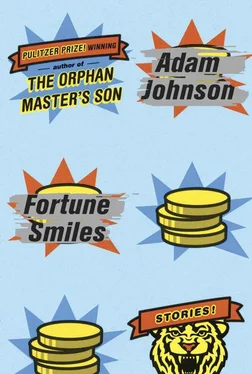The package he’s delivering isn’t some exotic engineering part or anything. When Nonc pulls the box off the shelf, the label reads Amazon . Nonc climbs down with it while Geronimo follows with the DIAD — it’s his job to get the signatures. An electrician wearing a flipped-up welder’s hood descends in a cherry picker to direct them toward a man sitting on the only surviving dock, reading blueprints.
He’s an older guy, in his fifties probably, wearing a green boonie-rat hat and some serious binoculars, the kind with orange lenses. Nonc and the boy make their way over, Nonc calling out the address label, “Bob Vollman, City of Tulsa Utilities, care of Lake Charles, Louisiana.”
“That would be me,” Vollman says. “Thank God for Amazon — and UPS, of course.” With a folding knife, he unwraps Snyder’s Guide to the Birds of the Gulf Wetlands .
“People mostly shoot at birds around here,” Nonc says.
Geronimo holds up the DIAD, and the engineer takes notice of him, pulls off his hat. With his hand, like a puppet, he makes the floppy hat talk like Yoda. “A signature is wanted, hmm?” the hat asks. “And here we have what, hmm, a child, a boy child, have we, yes?”
Geronimo nears the hat and stares into its folds as if trying to determine its intentions.
Yoda scrunches his face. “Serious, this one is, hmm. Much turmoil has he seen.” The engineer glances at Nonc for confirmation. “All around is uncertainty.” The puppet looks up and down the street, but Geronimo doesn’t follow. “Broken are many things, yes, and not in their proper places.” Vollman has the puppet take the stylus and, mumbling as if its mouth is too full to talk, sign the DIAD. That gets a laugh.
“Got a boy exactly his age,” Vollman says. “Two kids off to college, and then along comes Henry.”
“Cajuns call that lagniappe,” Nonc says. “It means getting more than you were bargaining for.”
“I tell you,” Vollman says, tousling Geronimo’s hair. “It sure is hard to leave them.”
Nonc has tried to imagine that moment Marnie put the boy in the van — if only he could think up what she said to him when she left, maybe he’d know where she went, when she might be coming back for him.
“What did you tell him,” Nonc asks, “you know, when you left?”
“Henry?”
“Yeah.”
“I said, ‘I’ll be right back.’ Kids this age, they don’t understand time. They don’t know what a month is. Plus, they don’t remember. I made some mistakes, parent-wise, believe me. At this age, you got some wiggle room.”
“This is all just temporary,” Nonc says. “The boy’s going back with his mama soon.”
“The hurricane turned some lives upside down,” Vollman says. “Obviously, you two are in some kind of situation, but seriously, the boy can’t be running around in his jammies. Look at the glass and nails. He needs some boots and jeans, something.”
The pajamas are actually a custom tracksuit that Relle made for the boy, but Nonc doesn’t say anything.
Vollman lifts up his new field guide. “Amazon has tons of kid stuff.”
At the sight of the book, Geronimo says, “Bird.”
“That’s right,” Vollman says. “Let’s check out a tweety bird.” He lifts the binoculars and invites Geronimo to share, each peering through one of the lenses. Squinting, they do a sweep of the lake. “Saw a blue macaw this morning,” Vollman says. “Not exactly Louisiana wildlife, but quite a sight. It was sitting on an upturned barge, right out there on the water, a big bell pepper in its beak.”
“Macaw,” the boy says.
“That’s right,” Vollman says.
“Big bird.”
“That’s right, she was one big bird.”
Standing above them, Nonc, too, looks out on the water. With the outbound tide, all the refuse in the lake is dog-paddling back toward them, across three miles of brown chop. Shielding his eyes, Nonc makes out roof timbers, recycling bins, logged couch cushions and all the garage-filling crap a human could own. Out there slowly turning, as if from a logroller, is a black septic tank, and from the water, like a shark, a boat hull rises, flashes its keel and vanishes. Nonc had been picturing those kids tossed from the bridge dropping into blue lake water. He imagined their eyes open, their hands reaching for one another, and the knowledge that at least they had each other. But here it is, dark, entangling, a roil of propane tanks, plywood sheets and fifty-five-gallon drums.
—
Nonc takes the long way around the lake, past abandoned ice trucks with their bellies dripping, past livestock gone blind from drinking salt water, past a church whose marquee reads, “The Eye of the Storm Is the Peace of Christ.” Here on the far side of the lake is the Southwest Louisiana Visitors’ Center, which is where Relle works. Instead of handing out brochures for “The Cajun Riviera,” Relle now spends her time drawing maps for relief workers to where towns like Gueydan and Grand Chenier used to be. Hurricane or no, the state is flush from gaming, so everybody still gets a souvenir bottle of Tabasco, a Sportsman’s Paradise ball cap and a string of Mardi Gras beads draped on by a pretty girl. Relle is the pretty girl.
Through the window, Nonc can see her talking to some government types, guys with that carefree look that comes from being able to walk away. They’re wearing like six strings of beads each, and they’re all smiling and laughing, with Relle pausing at their punch lines to fan herself with a coupon book. Nonc flashes his lights at her, points across the street to a roadhouse that Marnie used to haunt back in the day. He flips across the street, hits his hazards and jams a straw into a juicy box. “Baby drink juice,” Nonc tells the boy, and snags his cell. “Nonc be right back.”
Geronimo lifts his arms and strains at his bouncy chair. “Bway,” he says. “Bway.”
“Look,” Nonc says. “Nonc’s got business.”
Inside the roadhouse, he does a quick survey, then checks out a wall of beer mugs. If you hang out long enough, they put up a mug with your name on it. The wall’s a regular “Who’s Not Who” of South Louisiana, but no Marnie. The bartender looks like a tuffdick on leave from an oil rig. He asks, “What’ll it be,” and when Nonc says, “Nothing, thanks,” the bartender raps the bar twice with his knuckle, which is what riverboat dealers do to point out a lack of gratuity.
All casual, Nonc asks, “You know a Marnie Broussard, ever see her come around?”
“You trying to make some kind of small talk?” the bartender asks. “You want a drink or what?”
“This girl,” Nonc says. “She used to come in here, got dark hair, deep-set eyes.”
The bartender drafts a beer, sets it in front of Nonc like it’s the last one on earth. “Hurricane relief,” he says. “On the house.”
Nonc opens his phone, finds a weak signal and scrolls to the doctor’s number. He doesn’t really know what he’s going to say to the guy, but he calls. Just when it seems like no one’s going to answer, the phone picks up, but no one’s there. And then Nonc can hear the valve in his father’s trach tube clicking. Nonc hears that thing in his sleep. The history of that sound, of its wet, wheezy rhythm, is like a country song, it’s “The Battle Hymn of the Republic.”
If that doctor’s right, Nonc’s dad is going to die for sure this time. But the truth is, it’s just an event. Life’s full of events — they occur and you adjust, you roll and move on. But at some point, like when your girlfriend Marnie tells you she’s pregnant, you realize that some events are actually developments. You realize there’s a big plan out there you know nothing about, and a development is a first step in that new direction. Somebody drops a kid in your lap — that’s a development, you’ve just been clued in. Your ex — old lady disappears — you can’t shrug that off. It’s a serious development. Sometimes things seem like big-time developments — you get your wages garnished, your old man takes your car when he leaves town, you get evicted, your possessions get seized — but in time you adjust, you find a new way and you realize they didn’t throw you off course, they didn’t change you. They were just events. The truth is, the hurricane didn’t change Nonc’s life one bit. Neither will the death of his father. The tricky part, Nonc has figured out, is telling the difference between the two.
Читать дальше












